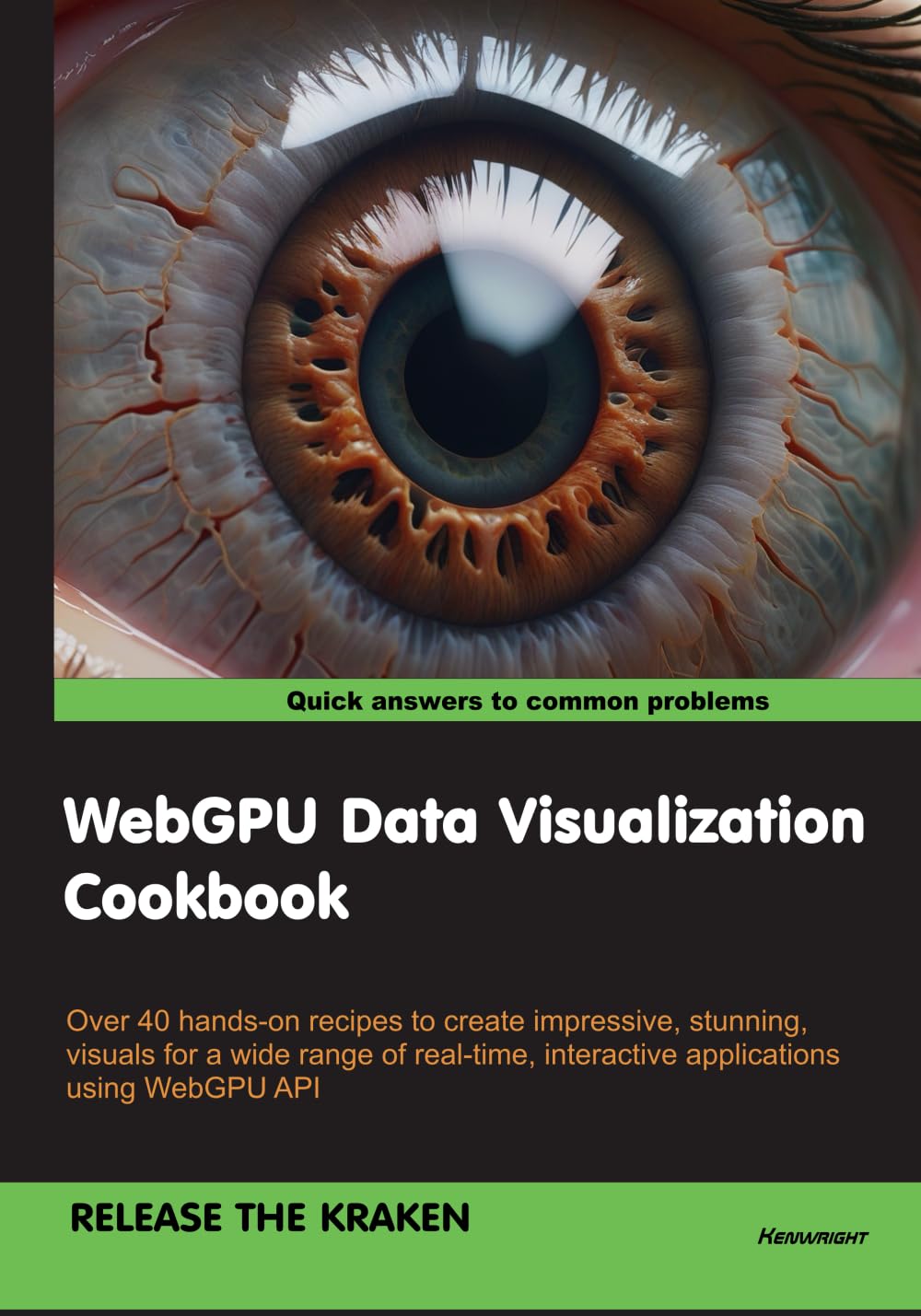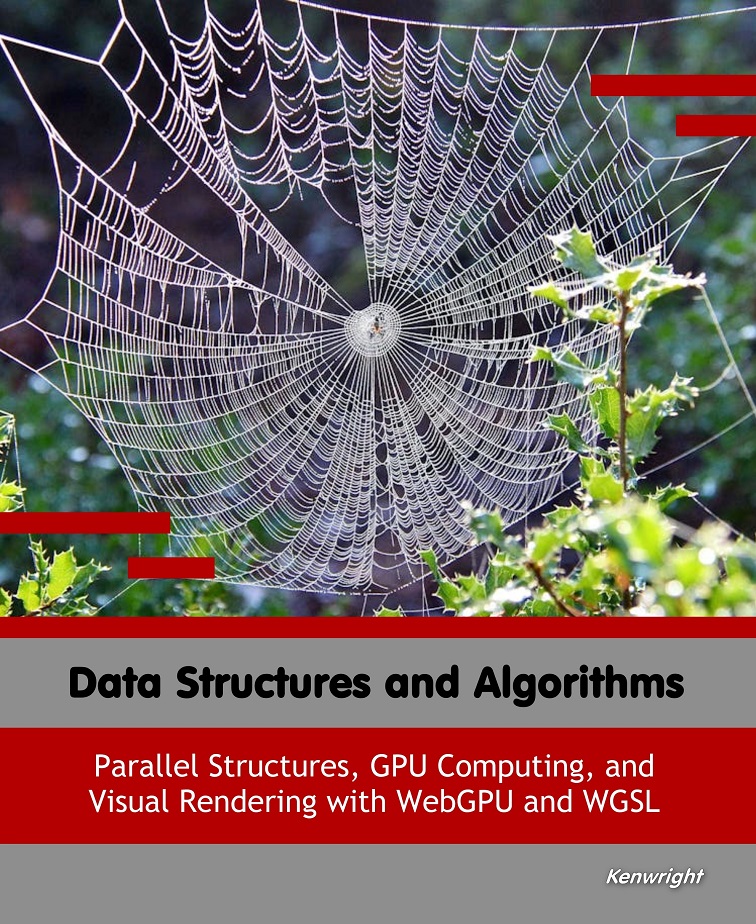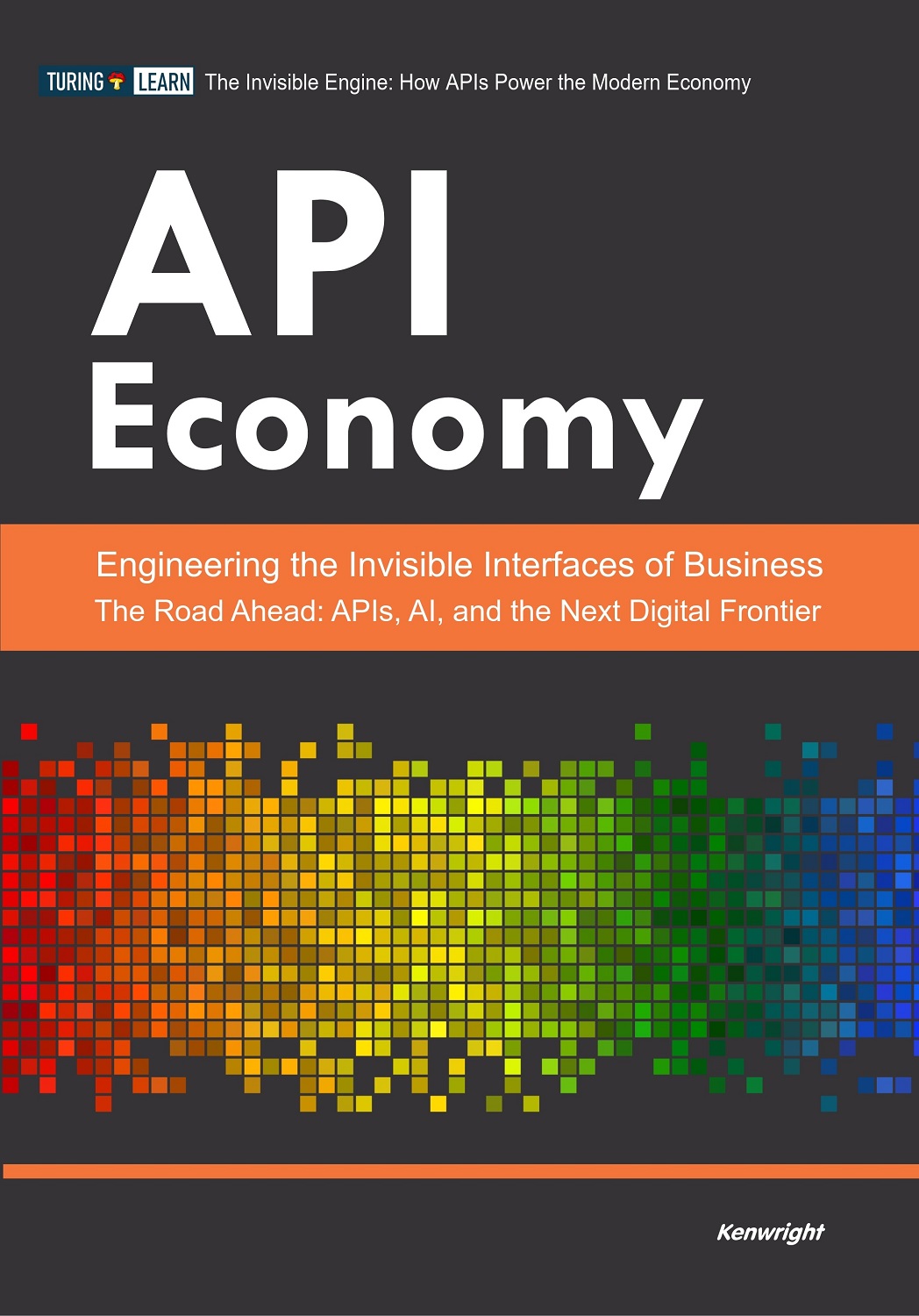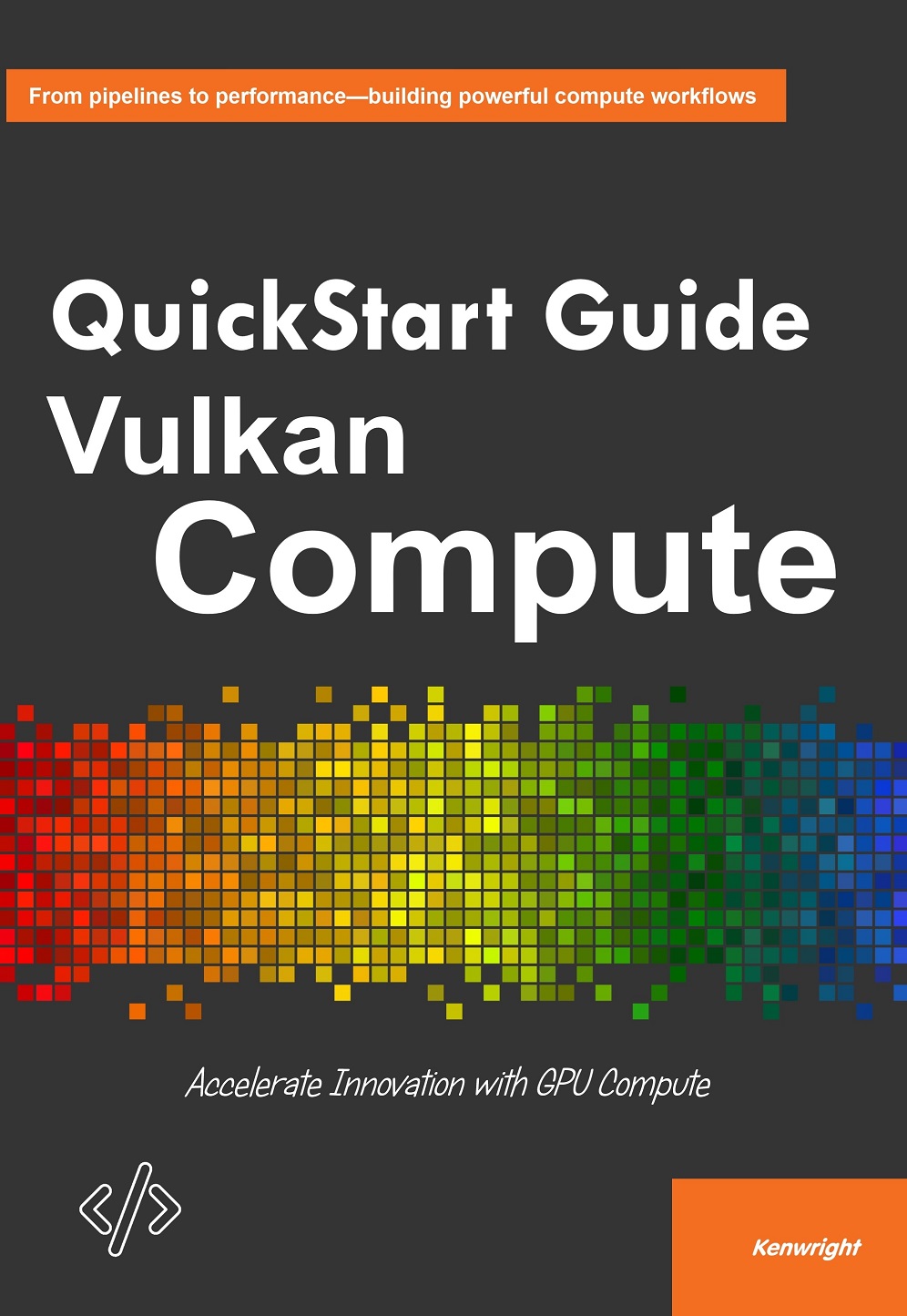
Quick Facts
- ISBN: 979-8311744461
- Published: February 22, 2025
- Pages: 409
- Language: English
- Categories: Books, Computers & Technology, Computer Science, AI & Machine Learning, Computer Vision & Pattern Recognition
Terms
About This Book
The inclusion of reflective questions at the end of each chapter invites readers to engage critically with the content. These prompts are particularly effective in helping learners internalize the principles of webgpu, wgsl, graphics, compute, shader, visualization, simulation, ai and relate them to their own experiences in webgpu and wgsl and graphics and compute and shader and visualization and simulation and ai. Practical applications are a key focus throughout the book. Each chapter on webgpu, wgsl, graphics, compute, shader, visualization, simulation, ai includes real-world examples, case studies, and exercises that help readers apply what they've learned to their own webgpu and wgsl and graphics and compute and shader and visualization and simulation and ai projects or research. What sets this book apart is its unique approach to webgpu, wgsl, graphics, compute, shader, visualization, simulation, ai. WebGPU Data Visualization Cookbook: combines theoretical frameworks with practical examples, creating a valuable resource for both students and professionals in the field of webgpu and wgsl and graphics and compute and shader and visualization and simulation and ai. Throughout the book, WebGPU Data Visualization Cookbook: maintains a tone that is both authoritative and encouraging. This balance helps demystify complex ideas in webgpu, wgsl, graphics, compute, shader, visualization, simulation, ai and fosters a sense of confidence in readers as they progress through the material. Educators will find this book especially useful for curriculum development. The structured layout, combined with discussion prompts and suggested readings on webgpu, wgsl, graphics, compute, shader, visualization, simulation, ai, makes it easy to integrate into a variety of webgpu and wgsl and graphics and compute and shader and visualization and simulation and ai courses.
Key Features
- Exercises and review questions
- Case-based learning scenarios
- Frequently asked questions (FAQs) section
- Cross-references to related concepts
- Latest research and developments
About the Author
WebGPU Data Visualization Cookbook:
As a leading authority on Books, WebGPU Data Visualization Cookbook: brings a unique perspective to webgpu, wgsl, graphics. They have taught at several prestigious universities and consulted for major organizations worldwide.
Related News & Articles
Want to start a literary magazine? The original Paris Review offices are for sale.
Nov 13, 2025George Plimpton, impresario founder of The Paris Review, has a literary legacy that keeps on giving. Now, fans of the man can peep into his old townho...
lithub.com“Paris Latino”: How Latin America Migrated to Europe
Nov 11, 2025“Paris est la capitale de l’Amérique latine,” said Mexican essayist Carlos Fuentes. The post “Paris Latino”: How Latin America Migrated to ...
www.publicbooks.orgThe Key Book Publishing Paths: 2025–2026
Dec 07, 2025Should you self-publish or traditionally publish? This infographic will help you determine the best choice for you and your project.
janefriedman.comA Summary and Analysis of ‘The Jilting of Jane’ by H. G. Wells
Nov 29, 2025By Dr Oliver Tearle (Loughborough University) ‘The Jilting of Jane’ is a short story by H. G. Wells (1866-1946). It’s included in his Complete S...
interestingliterature.comTimes New Roman Turns Right
Nov 24, 2025“Secretary of State Marco Rubio called the Biden-era move to [Calibri] ‘wasteful,’ casting the return to Times New Roman as part of a push to st...
www.mcsweeneys.netReader Reviews

Charles Moore
Sets a New Benchmark for Excellence
As someone with 11 years of experience in webgpu and wgsl and graphics and compute and shader and visualization and simulation and ai, I found this book to be an exceptional resource on webgpu, wgsl, graphics, compute, shader, visualization, simulation, ai. WebGPU Data Visualization Cookbook: presents the material in a way that's accessible to beginners yet still valuable for experts. The chapter on wgsl was particularly enlightening, offering practical applications I hadn't encountered elsewhere. This book exceeded my expectations in its coverage of webgpu, wgsl, graphics, compute, shader, visualization, simulation, ai. As a student in webgpu and wgsl and graphics and compute and shader and visualization and simulation and ai, I appreciate how WebGPU Data Visualization Cookbook: addresses both foundational concepts and cutting-edge developments. The writing style is engaging yet precise, making even dense material about webgpu, wgsl, graphics, compute, shader, visualization, simulation, ai enjoyable to read. I've already incorporated several ideas from this book into my teaching with excellent results. I approached this book as someone relatively new to webgpu and wgsl and graphics and compute and shader and visualization and simulation and ai, and I was pleasantly surprised by how quickly I grasped the concepts around webgpu, wgsl, graphics, compute, shader, visualization, simulation, ai. WebGPU Data Visualization Cookbook: has a gift for explaining complex ideas clearly without oversimplifying. The exercises at the end of each chapter were invaluable for reinforcing the material. It's rare to find a book that serves both as an introduction and a reference work, but this one does so admirably.

Mary Moore
An Instant Favorite on My Bookshelf
This book exceeded my expectations in its coverage of webgpu, wgsl, graphics, compute, shader, visualization, simulation, ai. As a educator in webgpu and wgsl and graphics and compute and shader and visualization and simulation and ai, I appreciate how WebGPU Data Visualization Cookbook: addresses both foundational concepts and cutting-edge developments. The writing style is engaging yet precise, making even dense material about webgpu, wgsl, graphics, compute, shader, visualization, simulation, ai enjoyable to read. I've already incorporated several ideas from this book into my research with excellent results. I approached this book as someone relatively new to webgpu and wgsl and graphics and compute and shader and visualization and simulation and ai, and I was pleasantly surprised by how quickly I grasped the concepts around webgpu, wgsl, graphics, compute, shader, visualization, simulation, ai. WebGPU Data Visualization Cookbook: has a gift for explaining complex ideas clearly without oversimplifying. The exercises at the end of each chapter were invaluable for reinforcing the material. It's rare to find a book that serves both as an introduction and a reference work, but this one does so admirably. This isn't just another book on webgpu, wgsl, graphics, compute, shader, visualization, simulation, ai - it's a toolkit. As someone who's spent 7 years navigating the ins and outs of webgpu and wgsl and graphics and compute and shader and visualization and simulation and ai, I appreciated the actionable frameworks and real-world examples. WebGPU Data Visualization Cookbook: doesn't just inform; they empower.

Robert Hernandez
A Brilliant Synthesis of Theory and Practice
What impressed me most was how WebGPU Data Visualization Cookbook: managed to weave storytelling into the exploration of webgpu, wgsl, graphics, compute, shader, visualization, simulation, ai. As a graduate student in webgpu and wgsl and graphics and compute and shader and visualization and simulation and ai, I found the narrative elements made the material more memorable. Chapter 5 in particular stood out for its clarity and emotional resonance. From the moment I started reading, I could tell this book was different. With over 6 years immersed in webgpu and wgsl and graphics and compute and shader and visualization and simulation and ai, I've seen my fair share of texts on webgpu, wgsl, graphics, compute, shader, visualization, simulation, ai, but WebGPU Data Visualization Cookbook: 's approach is refreshingly original. The discussion on webgpu challenged my assumptions and offered a new lens through which to view the subject. Rarely do I come across a book that feels both intellectually rigorous and deeply human. WebGPU Data Visualization Cookbook: 's treatment of webgpu, wgsl, graphics, compute, shader, visualization, simulation, ai is grounded in empathy and experience. The chapter on wgsl left a lasting impression, and I've already begun applying its lessons in my mentoring sessions.

Elizabeth Hernandez
Packed with Wisdom and Real-World Insight
Having read numerous books on webgpu and wgsl and graphics and compute and shader and visualization and simulation and ai, I can confidently say this is among the best treatments of webgpu, wgsl, graphics, compute, shader, visualization, simulation, ai available. WebGPU Data Visualization Cookbook: 's unique perspective comes from their 12 years of hands-on experience, which shines through in every chapter. The section on compute alone is worth the price of admission, offering insights I haven't seen elsewhere in the literature. As someone with 7 years of experience in webgpu and wgsl and graphics and compute and shader and visualization and simulation and ai, I found this book to be an exceptional resource on webgpu, wgsl, graphics, compute, shader, visualization, simulation, ai. WebGPU Data Visualization Cookbook: presents the material in a way that's accessible to beginners yet still valuable for experts. The chapter on shader was particularly enlightening, offering practical applications I hadn't encountered elsewhere. This isn't just another book on webgpu, wgsl, graphics, compute, shader, visualization, simulation, ai - it's a toolkit. As someone who's spent 4 years navigating the ins and outs of webgpu and wgsl and graphics and compute and shader and visualization and simulation and ai, I appreciated the actionable frameworks and real-world examples. WebGPU Data Visualization Cookbook: doesn't just inform; they empower.

Linda Moore
So Good I Read It Twice
I approached this book as someone relatively new to webgpu and wgsl and graphics and compute and shader and visualization and simulation and ai, and I was pleasantly surprised by how quickly I grasped the concepts around webgpu, wgsl, graphics, compute, shader, visualization, simulation, ai. WebGPU Data Visualization Cookbook: has a gift for explaining complex ideas clearly without oversimplifying. The exercises at the end of each chapter were invaluable for reinforcing the material. It's rare to find a book that serves both as an introduction and a reference work, but this one does so admirably. As someone with 2 years of experience in webgpu and wgsl and graphics and compute and shader and visualization and simulation and ai, I found this book to be an exceptional resource on webgpu, wgsl, graphics, compute, shader, visualization, simulation, ai. WebGPU Data Visualization Cookbook: presents the material in a way that's accessible to beginners yet still valuable for experts. The chapter on ai was particularly enlightening, offering practical applications I hadn't encountered elsewhere. I've been recommending this book to everyone in my network who's even remotely interested in webgpu, wgsl, graphics, compute, shader, visualization, simulation, ai. WebGPU Data Visualization Cookbook: 's ability to distill complex ideas into digestible insights is unmatched. The section on shader sparked a lively debate in my study group, which speaks to the book's power to provoke thought.

Jessica Jones
Required Reading for Anyone in the Field
From the moment I started reading, I could tell this book was different. With over 5 years immersed in webgpu and wgsl and graphics and compute and shader and visualization and simulation and ai, I've seen my fair share of texts on webgpu, wgsl, graphics, compute, shader, visualization, simulation, ai, but WebGPU Data Visualization Cookbook: 's approach is refreshingly original. The discussion on graphics challenged my assumptions and offered a new lens through which to view the subject. Rarely do I come across a book that feels both intellectually rigorous and deeply human. WebGPU Data Visualization Cookbook: 's treatment of webgpu, wgsl, graphics, compute, shader, visualization, simulation, ai is grounded in empathy and experience. The chapter on graphics left a lasting impression, and I've already begun applying its lessons in my mentoring sessions.

John Wilson
Insightful, Practical, and Engaging
This isn't just another book on webgpu, wgsl, graphics, compute, shader, visualization, simulation, ai - it's a toolkit. As someone who's spent 5 years navigating the ins and outs of webgpu and wgsl and graphics and compute and shader and visualization and simulation and ai, I appreciated the actionable frameworks and real-world examples. WebGPU Data Visualization Cookbook: doesn't just inform; they empower. What sets this book apart is its balanced approach to webgpu, wgsl, graphics, compute, shader, visualization, simulation, ai. While some texts focus only on theory or only on practice, WebGPU Data Visualization Cookbook: skillfully bridges both worlds. The case studies in chapter 2 provided real-world context that helped solidify my understanding of webgpu and wgsl and graphics and compute and shader and visualization and simulation and ai. I've already recommended this book to several colleagues. Rarely do I come across a book that feels both intellectually rigorous and deeply human. WebGPU Data Visualization Cookbook: 's treatment of webgpu, wgsl, graphics, compute, shader, visualization, simulation, ai is grounded in empathy and experience. The chapter on wgsl left a lasting impression, and I've already begun applying its lessons in my daily practice.

Jessica White
A Brilliant Synthesis of Theory and Practice
Rarely do I come across a book that feels both intellectually rigorous and deeply human. WebGPU Data Visualization Cookbook: 's treatment of webgpu, wgsl, graphics, compute, shader, visualization, simulation, ai is grounded in empathy and experience. The chapter on webgpu left a lasting impression, and I've already begun applying its lessons in my classroom. From the moment I started reading, I could tell this book was different. With over 9 years immersed in webgpu and wgsl and graphics and compute and shader and visualization and simulation and ai, I've seen my fair share of texts on webgpu, wgsl, graphics, compute, shader, visualization, simulation, ai, but WebGPU Data Visualization Cookbook: 's approach is refreshingly original. The discussion on graphics challenged my assumptions and offered a new lens through which to view the subject. This book exceeded my expectations in its coverage of webgpu, wgsl, graphics, compute, shader, visualization, simulation, ai. As a professional in webgpu and wgsl and graphics and compute and shader and visualization and simulation and ai, I appreciate how WebGPU Data Visualization Cookbook: addresses both foundational concepts and cutting-edge developments. The writing style is engaging yet precise, making even dense material about webgpu, wgsl, graphics, compute, shader, visualization, simulation, ai enjoyable to read. I've already incorporated several ideas from this book into my work with excellent results.

Karen Jones
Exceeded All My Expectations
From the moment I started reading, I could tell this book was different. With over 5 years immersed in webgpu and wgsl and graphics and compute and shader and visualization and simulation and ai, I've seen my fair share of texts on webgpu, wgsl, graphics, compute, shader, visualization, simulation, ai, but WebGPU Data Visualization Cookbook: 's approach is refreshingly original. The discussion on wgsl challenged my assumptions and offered a new lens through which to view the subject. What impressed me most was how WebGPU Data Visualization Cookbook: managed to weave storytelling into the exploration of webgpu, wgsl, graphics, compute, shader, visualization, simulation, ai. As a consultant in webgpu and wgsl and graphics and compute and shader and visualization and simulation and ai, I found the narrative elements made the material more memorable. Chapter 8 in particular stood out for its clarity and emotional resonance. Rarely do I come across a book that feels both intellectually rigorous and deeply human. WebGPU Data Visualization Cookbook: 's treatment of webgpu, wgsl, graphics, compute, shader, visualization, simulation, ai is grounded in empathy and experience. The chapter on simulation left a lasting impression, and I've already begun applying its lessons in my mentoring sessions.

Jessica Wilson
The Definitive Guide I've Been Waiting For
This isn't just another book on webgpu, wgsl, graphics, compute, shader, visualization, simulation, ai - it's a toolkit. As someone who's spent 16 years navigating the ins and outs of webgpu and wgsl and graphics and compute and shader and visualization and simulation and ai, I appreciated the actionable frameworks and real-world examples. WebGPU Data Visualization Cookbook: doesn't just inform; they empower. What impressed me most was how WebGPU Data Visualization Cookbook: managed to weave storytelling into the exploration of webgpu, wgsl, graphics, compute, shader, visualization, simulation, ai. As a lifelong learner in webgpu and wgsl and graphics and compute and shader and visualization and simulation and ai, I found the narrative elements made the material more memorable. Chapter 5 in particular stood out for its clarity and emotional resonance.
Readers Also Enjoyed

Introduction to Quantum Computing and Algorithms
View Details
Data Structures and Algorithms: Parallel Structure...
View Details
API Economy
View Details
Reader Discussions
Share Your Thoughts
Susan Jackson
The discussion on ai was particularly helpful for my current project. I'd love to hear how others have applied these concepts.
Posted 2 days ago ReplyWilliam Jones
I completely agree about webgpu! Have you checked out the additional resources the author mentions in the appendix?
Posted 5 days agoDavid Garcia
The case study on visualization was eye-opening. I hadn't considered that angle before.
Posted 6 days ago ReplyJennifer Moore
That's a great observation about graphics. It really adds depth to the discussion.
Posted 8 days agoSarah Moore
The case study on simulation was eye-opening. I hadn't considered that angle before.
Posted 16 days ago ReplyElizabeth Hernandez
Have you considered how compute ties into broader themes like identity or power?
Posted 2 days agoBarbara Rodriguez
I noticed a shift in writing style during the wgsl section - more conversational and reflective.
Posted 25 days ago ReplySusan Thomas
The comparison between shader and related fields was fascinating. It helped me see the bigger picture.
Posted 16 days ago Reply